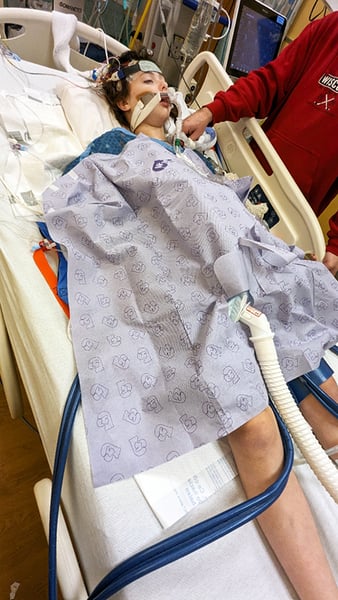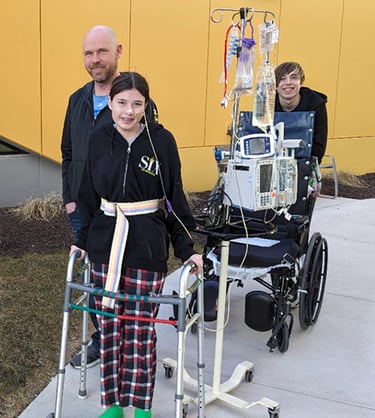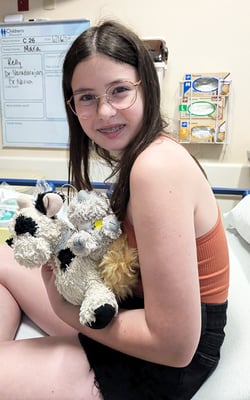
When Life Threw Mara a Curveball, Children’s Wisconsin Was There
Everything was normal for Mara Broman ... until it wasn't.
On Jan. 16, 2024, then 13-year-old Mara got a headache out of the blue at school. Unable to sit up, she lay in the school nurse's office with a bucket beside her, fighting the urge to throw up.
The school called Mara’s mom, Carrie. Immediately, she knew something wasn’t right and came to take Mara home. As Mara's condition worsened, and she complained of double vision, Carrie took her to a hospital near their home in Slinger, Wisconsin.
After numerous tests, including a CT scan, the doctors made a shocking discovery. Mara had a brain bleed.
“We were numb,” said Carrie. “We didn’t realize the seriousness of the situation. We've been so lucky. Our kids have always been healthy and had no major health issues. This was out of the blue.”
Realizing Mara required specialized care, the doctors contacted Children's Wisconsin. Within an hour, the Children’s Wisconsin Transport Team arrived and brought her down to the Milwaukee Hospital.
Critical Next Steps
 The Children's Wisconsin team prepped for her arrival — ready to tackle Mara's critical health issue. After Mara was admitted, she was rushed into the operating room where a team of pediatric neurosurgery specialists were prepared to give her the help her body demanded.
The Children's Wisconsin team prepped for her arrival — ready to tackle Mara's critical health issue. After Mara was admitted, she was rushed into the operating room where a team of pediatric neurosurgery specialists were prepared to give her the help her body demanded.
The on-call doctor at the time, Sean Lew, MD, a Pediatric Neurosurgeon, performed a three-and-a-half-hour surgery.
“We knew she had a hemorrhage upon arriving and that she was going to need surgery right away,” said Dr. Lew. “We had everything ready to go in the operating room and tried to streamline her care.”
During the surgery, Dr. Lew placed a drain to release cerebrospinal fluid building up inside the brain due to the blood. He then removed part of the skull bone to reduce pressure from the bleed.
“The important thing for somebody with her condition is to relieve the pressure inside her skull as quickly as possible, as it can lead to more brain damage and is life-threatening,” said Dr. Lew.
After surgery, a CT scan confirmed Mara’s official diagnosis: arteriovenous malformation (AVM). An AVM is an abnormal cluster of arteries and veins. It can develop anywhere in the body but usually presents in the brain or spinal cord.
Thought to be present at birth, an AVM often shows no symptoms, until one day it ruptures, as Mara's did.
“They’re kind of a little time bomb,” said Dr. Lew, who is also a Professor of Neurosurgery at the Medical College of Wisconsin, the academic partner of Children's Wisconsin.
With an AVM, the risk of bleeding is relatively low day-to-day. The chance of a bleed is estimated to be 2 to 4 percent per year. However, over the course of a lifetime, this risk is substantial. If left untreated, bleeding may cause brain damage by directly injuring the nearby brain or by causing further damage from increasing pressure within the skull, compromising blood flow to the rest of the brain.
“AVMs are relatively rare,” said Dr. Lew. “It’s estimated that about one in 10,000 people have them. And many people don't even know they have them.”
A Long Road to Recovery
 The normal course of healing for a child with an AVM rupture is to spend time in the Pediatric Intensive Care Unit (PICU) and rehabilitate. It's a long road to recovery and not everyone gets back to where they started.
The normal course of healing for a child with an AVM rupture is to spend time in the Pediatric Intensive Care Unit (PICU) and rehabilitate. It's a long road to recovery and not everyone gets back to where they started.
After surgery, Mara developed posterior fossa syndrome (PFS), a rare condition that can develop following a cerebellum injury. Mara lost the ability to breathe, talk, swallow, walk and coordinate voluntary movements. This is much more common in brain tumor patients and unusual for an AVM rupture.
“It's impossible to imagine what it feels like to see your child, who only days ago had never even been to a hospital, suddenly unable to do anything,” said Carrie. “She couldn't speak, eat, see clearly, sit, or even make a facial expression. But she was alive. It was all terrifying, but nobody at Children's Wisconsin was giving up on her, and neither were we.”
Mara remained in the PICU for 17 days, then continued her rehab in the Neurosciences Center.
After more than a month of daily or twice daily therapy sessions — feeding, speech, occupational and physical — Mara began to regain the critical skills she had lost. Finally, on March 4, 2024, Mara was ready to go home. In total, she spent 48 days in the hospital.
While recovery was long for Mara, her family knew she was in the right place.
"The level of care and compassion at Children’s Wisconsin is just outstanding," said Carrie. “The amount of personal care we got and the support to know that we were not in this alone, gave us the strength and confidence to rise above this challenging situation.”
 The Children's Wisconsin care team knew involving the whole family would speed Mara's recovery. Her parents were able to spend the night alongside Mara. Children's Wisconsin made sure they had the resources needed not only for Mara and her parents but also for her brother and sister.
The Children's Wisconsin care team knew involving the whole family would speed Mara's recovery. Her parents were able to spend the night alongside Mara. Children's Wisconsin made sure they had the resources needed not only for Mara and her parents but also for her brother and sister.
“We had an amazing team of hundreds of professionals who were here to support us and get us through this,” said Carrie. “It was the lifeline we needed.”
On the Comeback Trail
Thanks to ongoing therapies, Mara, now 14, has regained most of the abilities she had lost — though she has not fully regained her voice and still has some partial loss on her left side. Most importantly, Mara is back to being a happy teenager — loving school, extracurriculars like forensics, clarinet, cross country, as well as traveling and camping.
Mara will need additional treatment to prevent the AVM from rupturing again — either brain surgery or targeted radiation. But no matter what the future holds, the Broman family knows they’re in the best hands possible. They will be forever grateful for the care and compassion they received.
“This was a horrible situation,” said Carrie, “But it was made easier by the fact that the people there really cared about our child.”
Children's Wisconsin Resources
Written by
Allie Gray Freeland
Writer
Related Stories
No related articles found.



